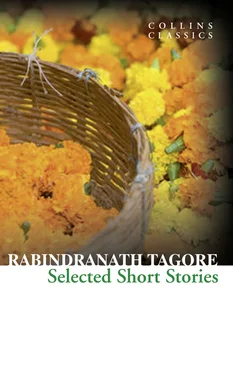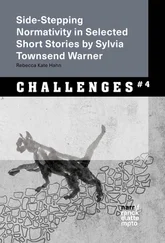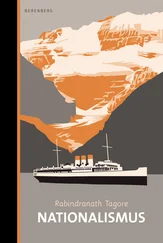So precarious was the position of my hero and my heroine, that my first impulse was to stop and buy something, since the man had been called. I made some small purchases, and a conversation began about Abdurrahman, the Russians, the English, and the Frontier Policy.
As he was about to leave, he asked: “And where is the little girl, sir?”
And I, thinking that Mini must get rid of her false fear, had her brought out.
She stood by my chair, and looked at the Cabuliwallah and his bag. He offered her nuts and raisins, but she would not be tempted, and only clung the closer to me, with all her doubts increased.
This was their first meeting.
One morning, however, not many days later, as I was leaving the house, I was startled to find Mini, seated on a bench near the door, laughing and talking, with the great Cabuliwallah at her feet. In all her life, it appeared, my small daughter had never found so patient a listener, save her father. And already the corner of her little sari was stuffed with almonds and raisins, the gift of her visitor. “Why did you give her those?” I said, and taking out an eight-anna bit, I handed it to him. The man accepted the money without demur, and slipped it into his pocket.
Alas, on my return an hour later, I found the unfortunate coin had made twice its own worth of trouble! For the Cabuliwallah had given it to Mini; and her mother, catching sight of the bright round object, had pounced on the child with: “Where did you get that eight-anna bit?”
“The Cabuliwallah gave it me,” said Mini cheerfully.
“The Cabuliwallah gave it you!” cried her mother much shocked. “O Mini! how could you take it from him?”
I, entering at the moment, saved her from impending disaster, and proceeded to make my own enquiries.
It was not the first or second time, I found, that the two had met. The Cabuliwallah had overcome the child’s first terror by a judicious bribery of nuts and almonds, and the two were now great friends.
They had many quaint jokes, which afforded them much amusement. Seated in front of him, looking down on his gigantic frame in all her tiny dignity, Mini would ripple her face with laughter and begin: “O Cabuliwallah! Cabuliwallah! what have you got in your bag?”
And he would reply, in the nasal accents of the mountaineer: “An elephant!” Not much cause for merriment, perhaps; but how they both enjoyed the fun! And for me, this child’s talk with a grown-up man had always in it something strangely fascinating.
Then the Cabuliwallah, not to be behindhand, would take his turn: “Well, little one, and when are you going to the father-in-law’s house?”
Now most small Bengali maidens have heard long ago about the father-in-law’s house; but we, being a little new-fangled, had kept these things from our child, and Mini at this question must have been a trifle bewildered. But she would not show it, and with ready tact replied: “Are you going there?”
Amongst men of the Cabuliwallah’s class, however, it is well known that the words father-in-law’s house have a double meaning. It is a euphemism for jail , the place where we are well cared for, at no expense to ourselves. In this sense would the sturdy pedlar take my daughter’s question. “Ah,” he would say, shaking his fist at an invisible policeman, “I will thrash my father-in-law!” Hearing this, and picturing the poor discomfited relative, Mini would go off into peals of laughter, in which her formidable friend would join.
These were autumn mornings, the very time of year when kings of old went forth to conquest; and I, never stirring from my little corner in Calcutta, would let my mind wander over the whole world. At the very name of another country, my heart would go out to it, and at the sight of a foreigner in the streets, I would fall to weaving a network of dreams,—the mountains, the glens, and the forests of his distant home, with his cottage in its setting, and the free and independent life of far-away wilds. Perhaps the scenes of travel conjure themselves up before me and pass and repass in my imagination all the more vividly, because I lead such a vegetable-like existence that a call to travel would fall upon me like a thunder-bolt. In the presence of this Cabuliwallah I was immediately transported to the foot of arid mountain peaks, with narrow little defiles twisting in and out amongst their towering heights. I could see the string of camels bearing the merchandise, and the company of turbanned merchants carrying some their queer old firearms, and some their spears, journeying downward towards the plains. I could see—. But at some such point Mini’s mother would intervene, imploring me to “beware of that man.”
Mini’s mother is unfortunately a very timid lady. Whenever she hears a noise in the street, or sees people coming towards the house, she always jumps to the conclusion that they are either thieves, or drunkards, or snakes, or tigers, or malaria, or cockroaches, or caterpillars. Even after all these years of experience, she is not able to overcome her terror. So she was full of doubts about the Cabuliwallah, and used to beg me to keep a watchful eye on him.
I tried to laugh her fear gently away, but then she would turn round on me seriously, and ask me solemn questions:—
Were children never kidnapped?
Was it, then, not true that there was slavery in Cabul?
Was it so very absurd that this big man should be able to carry off a tiny child?
I urged that, though not impossible, it was highly improbable. But this was not enough, and her dread persisted. As it was indefinite, however, it did not seem right to forbid the man the house, and the intimacy went on unchecked.
Once a year in the middle of January Rahmun, the Cabuliwallah, was in the habit of returning to his country, and as the time approached he would be very busy, going from house to house collecting his debts. This year, however, he could always find time to come and see Mini. It would have seemed to an outsider that there was some conspiracy between the two, for when he could not come in the morning, he would appear in the evening.
Even to me it was a little startling now and then, in the corner of a dark room, suddenly to surprise this tall, loose-garmented, man laden with bags; but when Mini would run in smiling, with her “O Cabuliwallah! Cabuliwallah!” and the two friends, so far apart in age, would subside into their old laughter and their old jokes, I felt reassured.
One morning, a few days before he had made up his mind to go, I was correcting my proof sheets in my study. It was chilly weather. Through the window the rays of the sun touched my feet, and the slight warmth was very welcome. It was almost eight o’clock, and the early pedestrians were returning home with their heads covered. All at once I heard an uproar in the street, and, looking out, saw Rahmun being led away bound between two policemen, and behind them a crowd of curious boys. There were blood-stains on the clothes of the Cabuliwallah, and one of the policemen carried a knife. Hurrying out, I stopped them, and enquired what it all meant. Partly from one, partly from another, I gathered that a certain neighbour had owed the pedlar something for a Rampuri shawl, but had falsely denied having bought it, and that in the course of the quarrel Rahmun had struck him. Now, in the heat of his excitement, the prisoner began calling his enemy all sorts of names, when suddenly in a verandah of my house appeared my little Mini, with her usual exclamation: “O Cabuliwallah! Cabuliwallah!” Rahmun’s face lighted up as he turned to her. He had no bag under his arm to-day, so she could not discuss the elephant with him. She at once therefore proceeded to the next question: “Are you going to the father-in-law’s house?” Rahmun laughed and said: “Just where I am going, little one!” Then, seeing that the reply did not amuse the child, he held up his fettered hands. “Ah!” he said, “I would have thrashed that old father-in-law, but my hands are bound!”
Читать дальше












